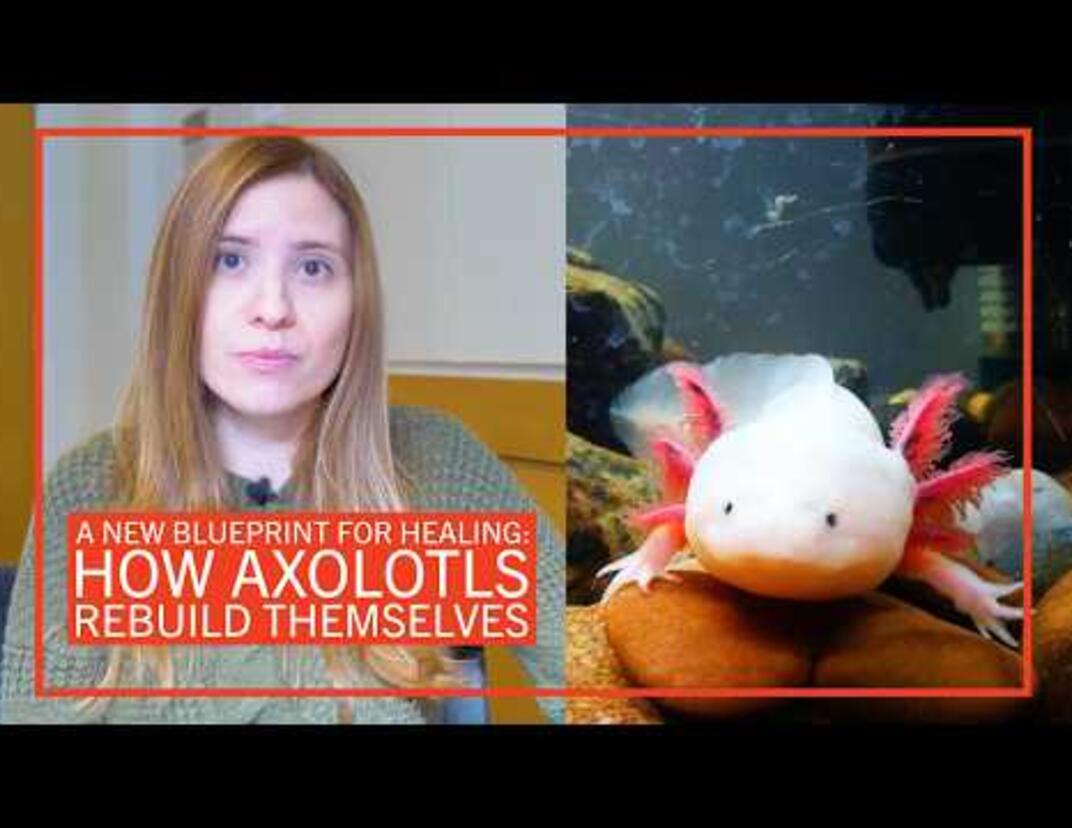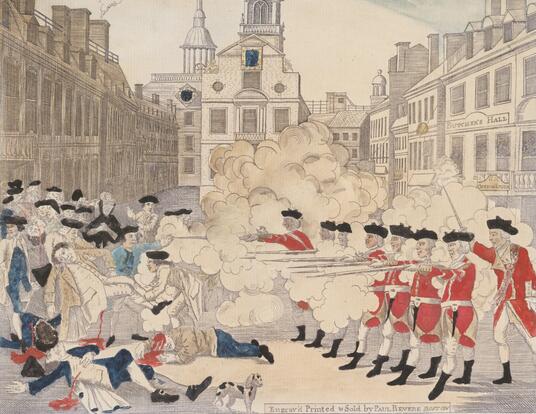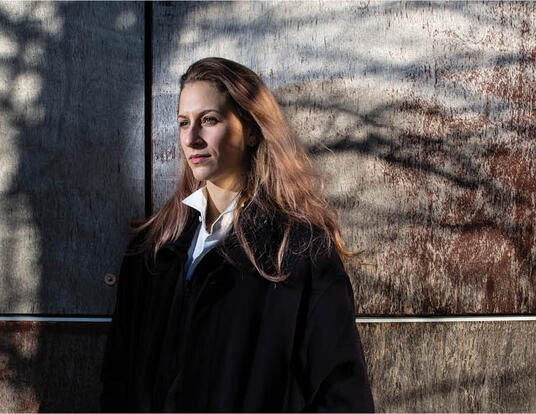Changing Minds
When it comes to changing minds, perception fights facts.

Research at Risk: Since World War II, universities have worked with the federal government to create an innovation ecosystem that has yielded life-changing progress. Now much of that work may be halted as funding is withdrawn. Find out more about the threats to medical, engineering, and scientific research, as well as how Harvard is fighting to preserve this work—and the University's core values.
Howard Gardner, PhD ’71, wrote the book on how to change minds, but he acknowledges that minds are not always easy—or even possible—to change.
PhD candidate Zoe Jenkin, who studies philosophy of mind, thinks she knows why.
John H. and Elisabeth A. Hobbs Research Professor of Cognition and Education at the Harvard Graduate School of Education, Gardner is best known for his revolutionary theory that humans are intelligent in ways you can’t measure through standard IQ tests. Almost all of his 30 books consider the mind: In them, he has analyzed the minds of leaders, creative individuals, and victims of brain damage, among others.
Amid growing national divides over hot-button issues, one of his lesser-known titles, Changing Minds: The Art and Science of Changing Our Own and Other People’s Minds, seems prescient. What would it take to change the minds of those who support a particular political view? And how to sway those who believe—in the face of mounting evidence to the contrary—that climate change is a hoax?
Gardner—he calls himself “a born pessimist who lives life as an optimist”—is struck by the complex shift in American media since Changing Minds was published in 2006. “To change minds, you have to have a different arsenal than you did back in the seemingly simple days where there was one nightly newscast and one newspaper that everybody read,” he says. “And we didn’t have social media.”
Gardner observes that, depending on which news outlets or alternative information sources they follow, people are not on the same page about what constitutes reality. He says, “I can’t think of a bigger problem.”
We reason in a way that leads to belief formation or belief change in a completely unconscious way.
—Zoe Jenkin
The Dynamics of Perception
Jenkin, who studies the relationship between beliefs and perceptual experience, agrees that reality can be pretty subjective. Descartes famously proposed that reality comes down to what we experience directly: a chair, for instance, that we can feel and see. The work of the mind—reason and rationalization—he argued, was separate from that of the body.
Descartes, Jenkin believes, was wrong. Jenkin counts herself among a handful of philosophers who take the view that the dynamics of perception are actually similar to what goes on in the process of reasoning. For a philosopher, her approach is uncharacteristically scientific, delving into psychology and neuroscience to explore how beliefs, desires, fears, and emotions influence perception.
We tend to think of reasoning as conscious and deliberate, as in depictions of a jury systematically weighing evidence before declaring a defendant guilty or not guilty. Yet, Jenkin says, “We reason in a way that leads to belief formation or belief change in a completely unconscious way.” Elements of our unconscious minds drive our behavior and beliefs all the time, she says. We just aren’t aware of it.
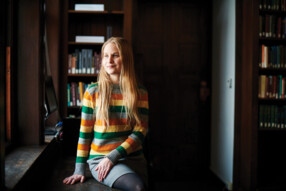
Take the marimba experiment. If people watch a xylophone-like instrument called a marimba being struck with a long, sweeping motion, they report hearing its tone for a longer time than if the instrument is struck abruptly. Yet the duration of the sound is identical.
“There’s this huge gap between the raw data that’s hitting our sensory organs—vibration on the eardrum or light on the retina, for instance—and what we experience,” Jenkin says. Our brains process, interpret, and store sensory input in networks we don’t fully understand and can’t access consciously, but that nevertheless inform our daily experiences and, by extension, our reasoning and beliefs.
Jenkin draws from literature for an example. The Jane Austen heroine of Emma, Emma Woodhouse, denies that she has feelings for Mr. Knightley. These unacknowledged emotions dictate her behavior on more than one occasion. But for most of the book, Emma doesn’t see it and won’t admit it.
Growing up in Greenwich Village, Jenkin was fascinated by MC Escher’s visual illusions. “I’ve always been interested in how our minds work, and why we have the beliefs and perceptions that we do,” she says. After majoring in English and philosophy at Williams, it struck Jenkin that while she loved reading and analyzing literature, she wanted to apply critical thinking to the world at large, not just the worlds within novels.
In the graduate program in philosophy at Harvard’s Graduate School of Arts and Sciences, she immediately set out to narrow the divide between perception and reason.
“Most people, like Descartes, want to say that perception rules,” Jenkin says. “What we can see and touch conveys a kind of pure access to the world, whereas I want to argue that having a perceptual experience is like reasoning your way to a belief. It just all happens unconsciously.”
Shifting Beliefs
Gardner is no stranger to challenging the canon. He once published a book of essays written by his critics—then refuted each one. His initially controversial redefinitions of intelligence and creativity became one of the seminal ideas of the 20th century.
In Changing Minds, Gardner reviews his expanded notion of intelligence: Intelligence could entail a proficiency for spoken and written language; understanding the causal relationships and numerical information essential for logic and mathematics; forming and manipulating spatial representations in one’s mind; solving problems using one’s whole body or fine motor skills; being attuned to one’s innermost self; and working effectively with and influencing others.
To change minds, you have to have a different arsenal than you did back in the seemingly simple days where there was one nightly newscast and one newspaper that everybody read.
—Howard Gardner
He identifies “six Rs” that can shift people’s thinking: resources, reason, research, resonance, representational re-description, and real-world events. Incorporating input from experts, stories, graphics, and ideas framed to resonate with particular audiences are all ways, Gardner posits, to change minds.
Take the example of President Donald Trump. In Gardner’s view, Trump’s “Strongman” persona resonates deeply with some. “As he rightly says, he could shoot people on Fifth Avenue and no one would care. His core [of supporters] is immovable.”
If resonance drives people to vote for Trump, perhaps that same tactic can change voters’ minds, Jenkin counters. “Combat it with a different kind of resonance, such as another candidate who is just as emotionally compelling,” she says.
How do people decide what to believe about climate change? Jenkin says individuals typically encounter scientific evidence supporting climate change that doesn’t reflect something they can experience first-hand. “Maybe there’s one degree of global warming, but you don’t really feel that difference, even though you read news articles describing the impact it has around the world. People are predisposed to believe what matches their perceptual experiences—that the climate is not changing—even in the face of facts to the contrary,” she says.
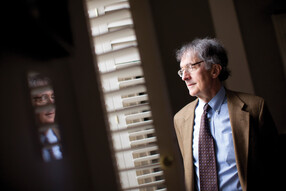
Gardner thinks that presented with enough convincing evidence, climate change deniers might change their minds. It won’t happen overnight, though.
“One of the things I do believe about changing minds is that Damascene moments are very rare. Changes happen gradually. You’re not even aware of it,” he says. “At a certain point you find yourself saying something or doing something you haven’t done before and you say, ‘Gee, you know, this is not the way I was a few years ago.’”
So, what will Gardner never change his mind about?
His sacred cows are universities, professions, and the truth with a capital T. “You can never convince me that we should get rid of American universities—although most Republicans think we should because they are not good for the nation. You’re never going to convince me that professions are bad, because even though there are a lot of bad professionals, being able to give disinterested feedback on complicated information is a tremendous human advance.
“And if you give up on truth,” he says, “forget it.”
Experiencing Right and Wrong
Gardner still receives—and personally answers—hundreds of emails about multiple intelligences. He’s heading up national and international studies of higher education, and he lectures around the world—as we spoke, he scribbled tweaks to his slides for a talk he was scheduled to give in Milan—and thinks about how to give back for the “charmed” life he’s led in almost six decades as a student and then a scholar at Harvard. (His latest book, a memoir called A Synthesizing Mind, is slated to appear in August 2020.)
Since the 1990s, Gardner has directed The Good Project, aimed at making students more ethical citizens. He blogs frequently about education and ethics, he says, not necessarily to change minds, but to fling his ideas into the cosmos in the hope they’ll lead to some good.
Next fall, Jenkin will join the philosophy department at Washington University in St. Louis as an assistant professor. She, too, thinks about how we experience right and wrong. She believes that too often we’re on autopilot—not just in ways that allow us to navigate the physical world, but also through deeply rooted emotions that hijack the rational part of our brains. “Especially with important things like voting, it’s good to try to question ourselves,” she says. “Especially if we get a hint that something is going awry.”
“I feel that it’s very bad for people whose personal lives are comfortable to think everything is okay with the rest of the world,” Gardner says. “I do whatever little thing I can to nudge things in a positive direction.” He pauses, smiles— a rare hiatus from the rapid-fire barrage of ideas that constitutes a conversation with Howard Gardner.
“You know,” he says, “sometimes I do feel like I’ve moved the needle a bit.”
Photos by Emiliano Ponzi
Get the Latest Updates
Join Our Newsletter
Subscribe to Colloquy Podcast
Simplecast



